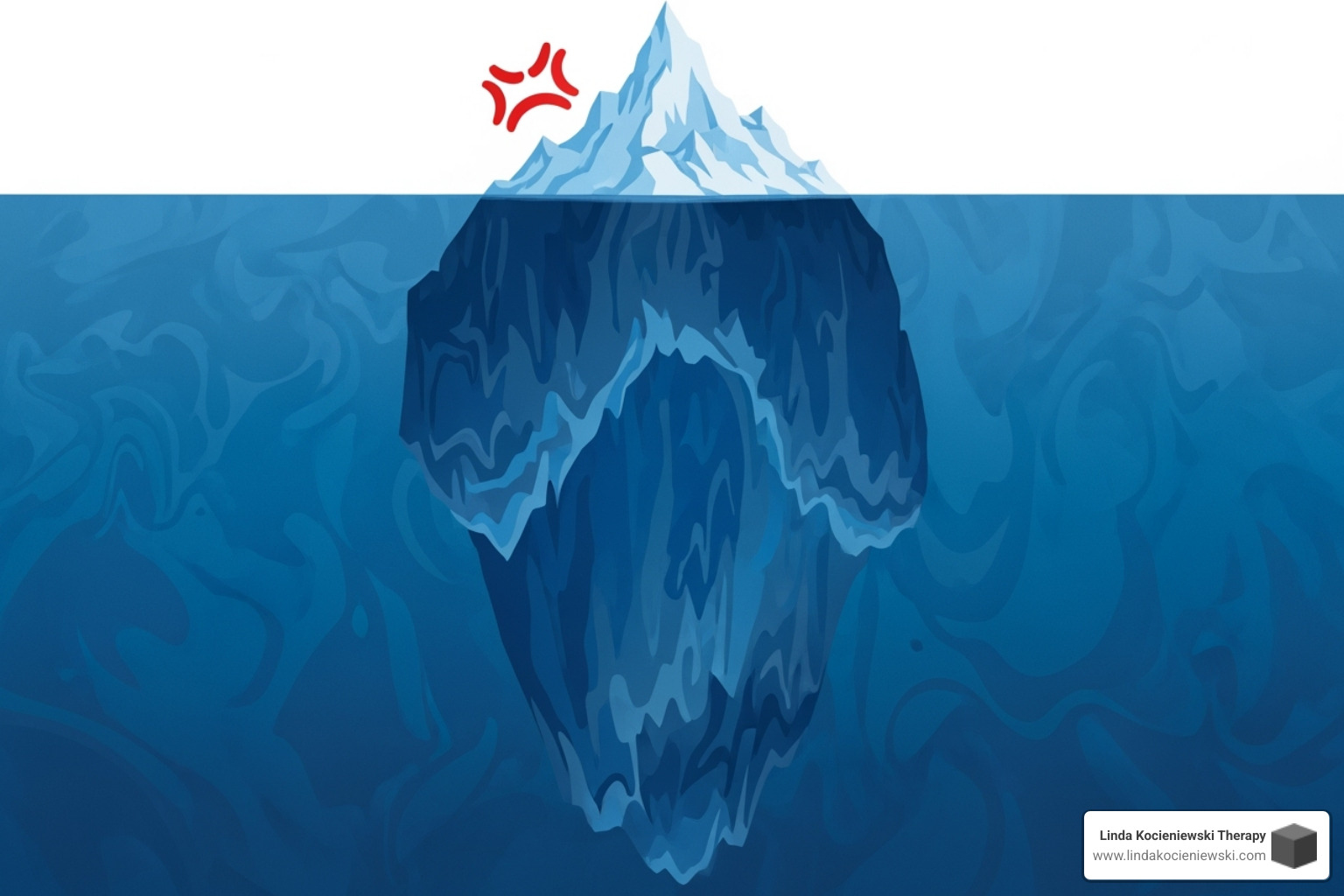Unlocking Peace: EMDR's Role in Taming Rage and Restoring Rest
Why EMDR for Anger Management is a Game-Changer for Healing

EMDR for anger management offers a powerful pathway to address explosive rage and chronic hostility by targeting the root traumatic experiences that fuel these overwhelming emotions, rather than just managing surface-level symptoms.
Quick Overview: EMDR for Anger Management
- What it treats: Rage outbursts, chronic hostility, self-directed anger, violent impulses, and revenge obsessions
- How it works: Uses bilateral stimulation (eye movements or tapping) to reprocess traumatic memories that trigger anger
- Key benefit: Addresses root causes rather than just teaching coping strategies
- Typical results: Reduced anger intensity, fewer outbursts, improved emotional regulation
- Who it helps: Adults with anger stemming from unresolved trauma or distressing life experiences
If your anger feels disproportionate to the situation, leaving you feeling out of control and damaging your relationships, you're not alone. Problematic anger often has deep roots in unresolved trauma—painful experiences your brain never fully healed. When something in your current life reminds your nervous system of that past hurt, your anger response can feel overwhelming and automatic.
Traditional anger management often focuses on controlling symptoms with breathing exercises or counting. While helpful, these strategies don't address why the anger is so intense. EMDR therapy takes a different approach by helping your brain process and integrate the underlying traumatic memories.
As a Certified EMDR Therapist and EMDRIA Approved Consultant, I have witnessed how EMDR for anger management can transform lives by addressing root causes. Through personalized, attachment-focused EMDR, I can help your nervous system find the peace it's been searching for.
Understanding Anger: The Protective Emotion That Can Overwhelm

Anger isn't the villain we often make it out to be. It's a natural, healthy emotion wired into our brains as a protective mechanism. Think of it as an internal security guard. When you feel dismissed, threatened, or treated unfairly, that surge of anger is your fight-or-flight response kicking in to signal that a boundary has been crossed or that something isn't right. This protective function is essential; it helps us set boundaries, defend ourselves, and motivate change.
But sometimes, this system becomes overactive and dysregulated. When anger becomes problematic, it stops protecting and starts causing harm. You might have disproportionate reactions, like screaming over a minor mistake, or experience chronic hostility, leaving you feeling cynical and irritated most of the time. The impact on relationships can be devastating, causing loved ones to become distant, anxious, or feel like they are walking on eggshells. Chronic anger also takes a significant physical toll. The constant state of high alert floods your body with stress hormones like cortisol and adrenaline, which over time can contribute to serious health issues like high blood pressure, heart disease, chronic headaches, digestive problems, and a weakened immune system.
Crucially, anger is often a secondary emotion. This is a core concept in EMDR for anger management. Like an iceberg, the visible rage is just the tip. Underneath the surface lies a much larger, often hidden mass of more vulnerable primary feelings like hurt, fear, powerlessness, shame, and injustice. For example, a parent's fury over a missed curfew may look like anger, but it could be masking deep fear for their child's safety. A partner's angry outburst about an unwashed dish might actually stem from a deeper feeling of being unappreciated and taken for granted. These underlying emotions often feel too vulnerable or painful to express, so they get covered by the more powerful and protective shield of anger.

Infographic: The "Anger Iceberg" illustrates anger as the visible tip, while underlying emotions like fear, hurt, shame, sadness, anxiety, and guilt form the larger, submerged portion that often drives problematic anger.
When Healthy Anger Turns into Problematic Rage
How do you know when your anger has crossed a line from a healthy emotion to a harmful pattern? The signs can be explosive and obvious, like temper outbursts, verbal aggression, and physical intimidation. However, they can also be more subtle, such as chronic irritability, cynicism, passive-aggression (the silent treatment, sarcasm, backhanded compliments), and frequent road rage. Sometimes, anger is turned inward as harsh self-criticism, perfectionism, and self-sabotaging behaviors.
The key question is when to seek help. Professional attention may be needed if your anger:
- Interferes with your daily life, negatively affecting your job, parenting, or social connections.
- Feels out of control or frightening, leaving you with intense feelings of regret or shame over your actions or words.
- Seems disproportionate to the situation, with rage lasting for hours or even days over minor incidents.
- Follows consistent patterns, where specific triggers like feeling dismissed, criticized, or ignored always provoke an intense, automatic response.
- Is causing your loved ones to express fear or concern about your temper.
Problematic anger is highly treatable. EMDR for anger management helps heal the underlying wounds fueling these reactions, offering a path toward approaching your emotions with compassion instead of judgment and reclaiming control over your responses.
The Trauma-Anger Connection: Uncovering the Root of Your Reactions
Have you ever wondered why certain situations trigger such intense anger that it feels completely out of proportion? The answer often lies in unresolved trauma and distressing life experiences that continue to influence how your brain responds to stress in the present.
Normally, our brains are designed to process and file away memories, helping us learn from our experiences and move on. However, when we experience something traumatic or deeply distressing, this natural system can get overwhelmed and disrupted. The Adaptive Information Processing (AIP) model, which is the theoretical foundation of EMDR therapy, explains that traumatic memories can become "maladaptively stored." Instead of being integrated into your life's narrative, they remain frozen in time—raw, unprocessed, and emotionally charged. This involves a breakdown in communication between key brain regions: the amygdala (the brain's smoke detector) remains hyper-vigilant, the hippocampus (which provides context to memories) struggles to file the event as being in the past, and the prefrontal cortex (the rational brain) is unable to regulate the emotional fallout.
When a current event even slightly resembles an aspect of these unprocessed memories, your brain can react as if the original trauma is happening all over again. This trauma response often shows up as overwhelming anger. For example, a parent's explosive rage at their children for not listening might stem from their own childhood experiences of feeling powerless, ignored, and unheard. The old hurt is still active and alive in their nervous system, and the children's behavior, while frustrating, becomes a trigger that releasees decades of stored pain.
EMDR shifts the focus from anger symptom management to uncovering and addressing these root causes. Trauma isn't limited to "big T" events like combat, assault, or a major accident. "Small t" traumas—such as childhood emotional neglect, persistent criticism from a parent, public humiliation, bullying, or chronic stress—can be just as impactful, especially when they happen repeatedly. Over time, these experiences can create the same maladaptive memory networks that fuel problematic anger. Imagine an adult who grew up with a highly critical parent. As an adult, when their boss offers constructive feedback, their nervous system doesn't hear helpful advice. It hears the old, painful echo of "You're not good enough," triggering an intense, defensive anger response that seems baffling to coworkers and even to the person themselves.
While traditional talk therapy is valuable, it can sometimes struggle to access the deep-seated emotions and bodily sensations tied to these stuck memories. You might understand intellectually why you get angry—"I know my anger comes from my childhood"—but the core emotional wound remains untouched, and the physical reaction still takes over. This is why EMDR for anger management is so transformative. It provides a direct pathway to access and reprocess the root memories driving your reactions, working with your brain's natural healing capacity to finally "digest" those stuck experiences and their associated physical sensations, emotions, and negative beliefs.
Understanding this trauma-anger connection offers profound hope. Your intense anger isn't a character flaw; it's often your nervous system's outdated and desperate attempt to protect you based on past hurts. With the right therapeutic approach, you can help your brain update its threat detection system and find a more peaceful, adaptive way of moving through the world. To learn more about how trauma impacts the body, you can explore Where is Trauma Stored in the Body and How EMDR Can Help.
How EMDR for Anger Management Works: Healing from the Inside Out

EMDR for anger management doesn't just involve talking about your feelings—it helps your brain rewire itself for lasting change. EMDR (Eye Movement Desensitization and Reprocessing) uses your brain's natural, innate healing processes to transform how you respond to anger triggers.
This change happens through bilateral stimulation (BLS). During sessions, you might follow my finger with your eyes, listen to alternating tones in headphones, or experience gentle, alternating taps on your hands or knees. This rhythmic, back-and-forth stimulation engages both hemispheres of your brain, which appears to mimic the processing that occurs during REM (Rapid Eye Movement) sleep. This unique process helps your brain access and finally process "stuck" traumatic memories, reducing their emotional charge and breaking their powerful hold on your present-day reactions.
As we work together, the negative beliefs that fuel your anger—like "I'm powerless," "I'm not safe," or "I'm always out of control"—begin to shift and lose their grip. Your brain naturally installs more adaptive, truthful beliefs, such as "I have choices now," "I am safe in the present," or "I can handle difficult situations calmly." This isn't forced positivity or simple positive thinking; it's a deep, cognitive shift that arises organically from your brain's own innate wisdom. You can learn more about this transformative therapy on our dedicated EMDR Therapy page.
The 8 Phases of EMDR Applied to Anger
EMDR follows a structured, eight-phase protocol that I personalize for your specific experiences with anger. This evidence-based roadmap ensures a safe, thorough, and lasting healing journey.
- History Taking: We thoroughly explore your anger's history, map out current triggers, and identify the key life experiences (both "big T" and "small t" traumas) that may be fueling your reactions. We create a target sequence plan for our work together.
- Preparation: This phase is crucial for anger work. I teach you essential grounding techniques and emotional regulation skills, such as the "container" or "calm place" exercises. These tools build a foundation of safety and trust, ensuring you have resources to manage difficult emotions both in and out of sessions.
- Assessment: We activate a specific target memory linked to your anger. We identify the vivid image, the negative self-belief associated with it (e.g., "I am helpless"), the related emotions and physical sensations, and the positive belief you'd rather feel (e.g., "I am in control now").
- Desensitization: While you hold the target memory in mind, we begin sets of bilateral stimulation. You simply notice whatever comes up without judgment. The memory's distress level naturally decreases as your brain reprocesses the information.
- Installation: Once the memory is no longer disturbing, we focus on strengthening the positive, adaptive belief you identified earlier. We use BLS to link this new, empowering belief with the original memory until it feels fully true.
- Body Scan: We check for any lingering physical tension or discomfort in your body related to the memory, as anger and trauma are often held physically (e.g., a tight jaw, clenched fists). We continue processing until your body feels calm and clear.
- Closure: Every session ends with techniques to ensure you feel grounded, stable, and back in the present moment before you leave, often by using the resourcing skills learned in Phase 2.
- Re-evaluation: At the beginning of subsequent sessions, we check in on the previously processed targets to confirm that the positive changes are holding and your distress levels remain low. This ensures the healing is durable.
Targeting Specific Anger Issues with EMDR for Anger Management
EMDR for anger management is a versatile and precise tool that can be adapted to address the full spectrum of anger-related challenges.
- For rage and explosive outbursts, EMDR targets the underlying traumatic memories that act as rocket fuel. As these memories are reprocessed, triggers lose their power, leading to calmer, more measured responses.
- For chronic hostility and verbal aggression, EMDR can process the accumulated smaller traumas ("death by a thousand cuts") that contribute to a constant state of defensiveness and irritability.
- For self-directed anger and harsh self-criticism, EMDR addresses the root causes often linked to childhood experiences of shame, neglect, or feeling "not good enough," replacing the inner critic with self-compassion.
- For passive-aggressive behavior, EMDR can help uncover the fears of direct conflict that often underlie this pattern, processing the memories that taught you it wasn't safe to express your needs openly.
- For parents struggling with angry parenting patterns, EMDR helps break painful generational cycles by reprocessing their own childhood experiences that created those default, reactive responses.
- EMDR has also shown remarkable results with violent impulses. One study on an active-duty marine demonstrated a significant reduction in obsessive violent impulses after just four EMDR sessions. You can read more about this research on treating violent impulses with EMDR.
The goal isn't to eliminate anger entirely, but to transform it from a destructive force that controls you into a healthy, manageable signal that empowers you.
Benefits and Outcomes: Reclaiming Your Peace and Presence

When you commit to EMDR for anger management, you are starting on a journey toward genuine, lasting change that goes far beyond simply learning to count to ten. The outcomes can be profound and life-altering.
One of the first shifts you'll likely notice is a reduced anger intensity and decreased outburst frequency. The emotional volume gets turned down significantly. A trigger that used to provoke a 10/10 rage might now only cause a 3/10 flicker of annoyance that passes quickly. Through the EMDR process, improved emotional regulation develops naturally. You begin to recognize early warning signs in your body and mind, creating a crucial internal pause button that allows you to choose your response rather than being hijacked by an automatic reaction.
The real magic, however, lies in the resolution of underlying trauma. When the old wounds that fueled the anger finally heal, the anger itself simply loses its power. This isn't suppression or avoidance; it's true healing from the inside out. Situations that used to guarantee an outburst may start to feel neutral. You can learn more about this process at How to Heal from Trauma.
The positive ripple effects extend to all areas of your life. Your relationships often improve dramatically as you become less reactive and more present. Loved ones no longer feel the need to walk on eggshells, and communication becomes safer and more authentic. As the harsh inner critic is quieted by the reprocessing of shame-based memories, increased self-compassion emerges. You start treating yourself with more kindness, patience, and understanding. Many clients also report improved physical well-being, as resolving chronic trauma reduces the constant strain on the nervous system, leading to better sleep, fewer tension headaches, and lower stress levels. This all contributes to a dramatically improved quality of life, freeing up immense mental and emotional energy once consumed by anger, rumination, and guilt for joy, creativity, and connection.
Important Considerations for Using EMDR for Anger Management
While EMDR offers tremendous potential, a few factors are key to a successful outcome. The therapeutic relationship is the absolute foundation. To explore the vulnerable feelings often hidden beneath anger, you need a safe, supportive, and non-judgmental environment with a therapist you trust. Your readiness for deep work is also important—not a readiness to face everything at once, but an open-minded willingness to trust the process and your brain's capacity to heal. We always work at a pace that feels manageable and safe for you.
My approach incorporates attachment-focused EMDR, which is particularly powerful for anger stemming from early relationship wounds, neglect, or betrayal. By healing these relational wounds, we address the broader patterns of how you relate to yourself and others, creating more secure and fulfilling connections. It's normal to experience intense emotions during reprocessing sessions; this is a sign that stuck traumatic energy is finally moving and being released. As a skilled solo therapist, I provide consistent, dedicated guidance to help you steer these moments, ensuring they lead to lasting release and resolution. For those seeking to accelerate their progress, EMDR Intensives offer a more concentrated and immersive path to healing.
Frequently Asked Questions about EMDR for Anger
When people first find EMDR for anger management, they often have excellent questions about how it works and if it's the right fit for them. Here are answers to some of the most common concerns.
Is EMDR therapy only for PTSD?
This is a common misconception. While EMDR gained its fame as a highly effective treatment for Post-Traumatic Stress Disorder, it is a versatile therapy that can be applied to a wide range of emotional challenges. EMDR for anger management is effective because problematic anger so often stems from distressing memories that were never properly processed by the brain. EMDR helps your brain complete its natural healing process, whether your experiences meet the full clinical criteria for PTSD or not. Many clients find profound relief from anxiety, depression, grief, phobias, and complex anger issues using EMDR. For more information on EMDR's broad applications, you can Learn more about EMDR from EMDRIA, the official EMDR International Association website.
How long does EMDR therapy for anger take?
The timeline for EMDR for anger management is deeply personal and depends on your unique history, the complexity of your anger patterns, and your specific goals. There is no one-size-fits-all answer. However, because EMDR targets the root memories directly rather than just managing symptoms, many clients find it to be more efficient than traditional talk therapy. It's common to notice meaningful shifts in anger intensity and reactivity within the first few reprocessing sessions. For those who wish to accelerate their healing, intensive programs can be a powerful option. You can learn more about this concentrated approach in our article on EMDR Intensive Programs. The goal is always lasting, sustainable change, not a quick fix, and we will always work at a pace that feels right for you.
What if my anger isn't from a single "big T" trauma?
Many people believe they need a major, single-incident traumatic event to benefit from EMDR, but this isn't true. Much of the problematic anger we see in therapy stems from what we call "small t" traumas—a series of distressing life experiences that accumulate over time. These can include childhood emotional neglect, chronic bullying, painful breakups, persistent family conflict, or a highly critical environment. While they may not seem "traumatic enough" on their own, their cumulative effect can leave deep emotional wounds that fuel intense anger. EMDR's model is designed to help your brain process any distressing experience that has been stored in a problematic way. It doesn't matter if you can't point to a single major event; what matters is that your anger feels overwhelming or out of your control. Research supports EMDR's effectiveness for a wide range of adverse life experiences, not just those meeting PTSD criteria. You can find more information in the research literature about EMDR for experiences not meeting PTSD criteria.
What if I can't identify a specific memory that causes my anger?
This is a very common and valid concern. Many people know they feel angry, but they can't pinpoint a specific memory that started it all. That's perfectly okay. An experienced EMDR therapist can use techniques to help you find the source. One powerful method is the "Floatback" technique. We would start with a recent time you felt that intense anger, focus on the emotion and where you feel it in your body, and then I would guide you to "float back" through time to an earlier experience where you felt that same way. This allows your brain and body to lead the way to the formative memories that need healing, even if you can't consciously recall them at first.
Is online EMDR effective for anger management?
Yes, absolutely. The field of telehealth has advanced significantly, and online EMDR therapy has been shown to be just as effective as in-person sessions for many clients. I provide online EMDR for anger management using a secure, HIPAA-compliant video platform. Bilateral stimulation can be administered effectively through self-tapping (tapping on your knees or shoulders) or by following a light bar or dot on the screen. The key is having a private, quiet space where you won't be interrupted, allowing you to feel safe and focused during the deep processing work.
Conclusion: Find Your Path from Rage to Restoration
When anger feels overwhelming, it's easy to believe it's just part of who you are. But problematic anger is rarely a character flaw—it's a symptom pointing to deeper emotional wounds that need a chance to heal.
EMDR for anger management offers a fundamentally different approach. Instead of only managing symptoms, EMDR addresses the root causes of your anger. It helps your brain reprocess the traumatic memories and distressing experiences that fuel intense reactions. Through this process, triggers lose their power, and you can respond to life's challenges from a place of clarity and calm, not old pain.
Your anger doesn't have to define you. The goal isn't to eliminate this natural, protective emotion, but to transform it into a healthy signal that empowers rather than overwhelms you.
As a Certified EMDR Therapist and EMDRIA Approved Consultant, I specialize in attachment-focused EMDR to heal not just traumatic memories, but also the relational patterns that contribute to chronic anger. I offer consistent, personalized care custom to your unique history and goals.
With in-person sessions in Midtown, NYC and online therapy throughout New York State, this transformative work is accessible. If you're ready to address the root causes of your anger and reclaim your peace, I invite you to take the first step.
Schedule your complimentary Zoom consultation for EMDR in Midtown to discuss your needs and find how EMDR can help you transform your relationship with anger—and with yourself.